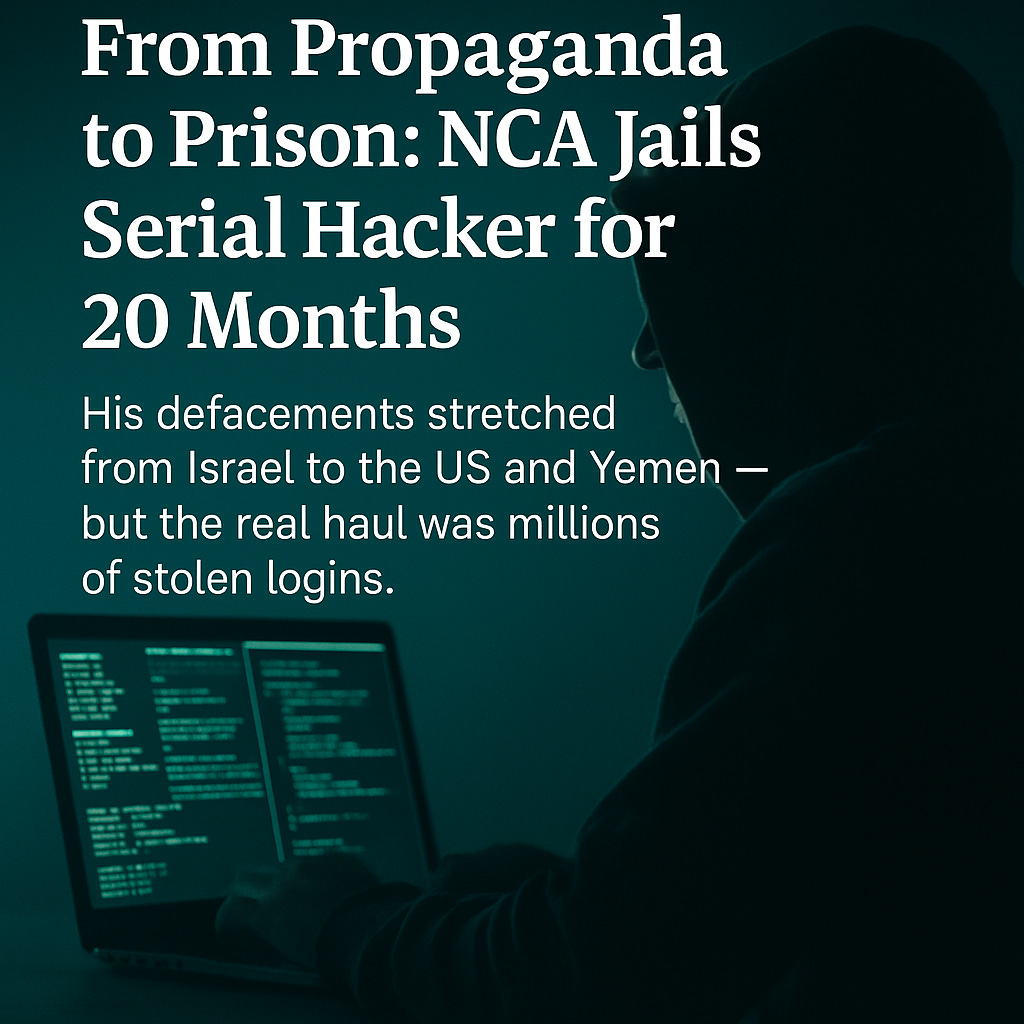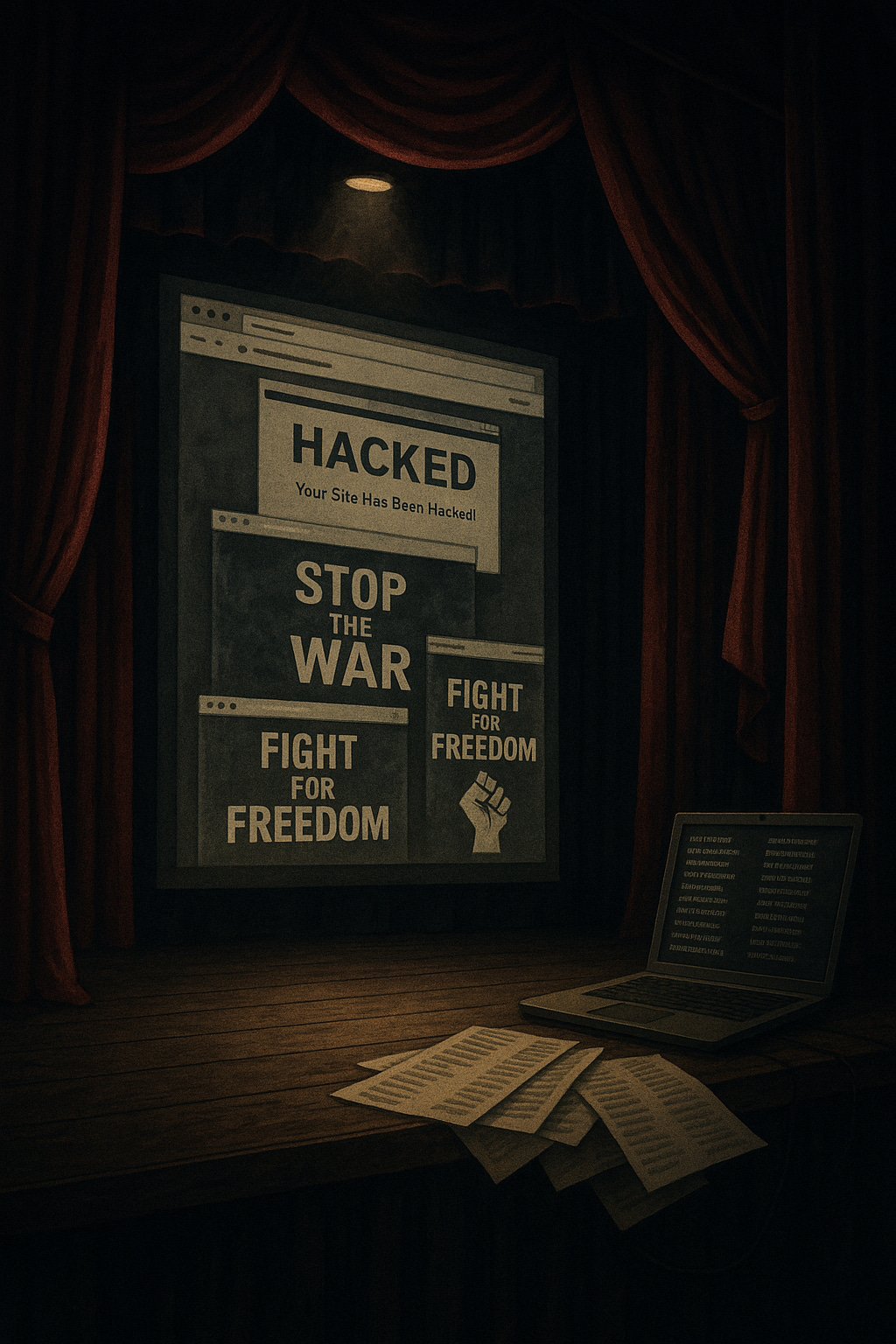From Propaganda to Prison: Serial Hacker Gets 20 Months After NCA Takedown
His banners screamed ideology across government sites in Israel and the US—but investigators uncovered the real prize: a massive credential theft operation.
The Show Ends in Rotherham
The curtain dropped in an unremarkable flat in Rotherham. Inside: laptops, hard drives, and one man who fancied himself both digital warrior and cyber-rockstar.
Al-Tahery Al-Mashriky, 26, wasn’t new to the stage. For years, he’d carved his name into the internet with defacements plastered across government domains, faith-based organizations, and even critical infrastructure. His favorite calling cards? Political slogans, ideological manifestos, banners screaming into the void. NCA investigators were able to link Al-Mashriky to the Yemen Cyber Army through social media and email accounts.
But when the National Crime Agency came knocking, they didn’t just find a graffiti artist in the digital alley. They found millions of stolen credentials—Facebook, Netflix, PayPal, entire swathes of everyday life siphoned off and stashed away like trophies.
The “hacktivist” label was theater. The credential thief was the truth.
Hacktivism as Stage Prop
Defacements are the oldest cyber trick in the book. They’re cheap, they’re loud, they get headlines. They also distract.
Al-Mashriky’s game wasn’t advanced exploitation—it was repetition. He didn’t need zero-days or bespoke implants. He preyed on the weak, the misconfigured, the forgotten. Each compromised site was another billboard for ideology, another performance to prove he mattered.
But behind the flashing banners, another show was running:
Harvested credentials spilling out of his devices.
Millions of logins sitting in neat little lists ready for resale or reuse.
Access turned into currency, traded in the dark corners where digital chatter never stops.
This wasn’t hacktivism. This was fraud draped in politics.
The Ego Economy
Cybercrime has its own economy, and ego is the tax you can’t avoid.
Al-Mashriky didn’t just hack—he bragged. On forums and in groups, he claimed 3,000 websites in three months. Not for money, not even for ideology—but for recognition.
Every boast was an IOU to investigators. Every defacement a breadcrumb. Every credential dump another nail in his digital coffin.
And in the end, it wasn’t the millions of stolen logins that brought him down. It was the performance. The need to be seen. The compulsive posting of proof.
Why the Sentence Matters (and Why It Doesn’t)
On August 15, 2025, the UK court handed him 20 months in prison. For some, that sounds light. For others, it’s symbolic: a line in the sand that hacktivism isn’t harmless vandalism—it’s data theft, fraud, and operational disruption wrapped in a slogan.
But here’s the uncomfortable truth: while Al-Mashriky serves time, the tactics don’t. Defacement will remain a smokescreen. Credentials will remain currency. And the next ego-driven operator is already warming up backstage.
The CodeAIntel Breakdown
Defacement is theater. It grabs headlines, it confuses responders, but it’s never the real play.
The real payload is identity. Stolen logins fuel fraud, social engineering, and resale markets. That’s where the money—and the damage—lives.
Ego is the investigator’s ally. Bragging rights on forums accelerate investigations faster than malware signatures ever will.
Sentences are signals, not solutions. Punishment sets precedent, but the cycle persists until credentials stop being the weakest link.
What To Do (Before You’re the Next Stage)
Audit and isolate. Stop assuming your public-facing site is “too small” to matter. If it can be defaced, it can be used.
Credential hygiene isn’t optional. Weak or reused passwords are still the number-one breach vector. Kill them before they kill you.
Monitor your name in the underground. If your org pops up in a dump, you’re not the first to know—you’re the last.
Don’t chase graffiti. If your SOC is consumed by web banners, the real damage—the credential theft—has already passed you by.
Final Word
Al-Mashriky thought he was scripting ideology into cyberspace. In reality, he was a middle-tier credential broker with a flair for banners and a desperate need for clout. The NCA closed his act, but the stage is never empty.
Somewhere else, another defacer is polishing their slogans, another ego is counting breached sites, and another organization is about to mistake propaganda for the real payload.
At CodeAIntel, we don’t watch the slogans. We watch the trade. Because in cybercrime, the show is never on stage—it’s always in the backroom.
Soruce: https://www.nationalcrimeagency.gov.uk/news/serial-hacker-who-defaced-official-websites-is-sentenced






